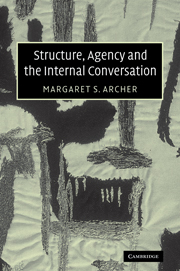Book contents
- Frontmatter
- Dedication
- Contents
- List of figures
- Acknowledgements
- Introduction: how does structure influence agency?
- Part I Solitude and society
- 1 The private life of the social subject
- 2 From introspection to internal conversation: an unfinished journey in three stages
- 3 Reclaiming the internal conversation
- 4 The process of mediation between structure and agency
- Part II Modes of reflexivity and stances towards society
- Index
4 - The process of mediation between structure and agency
Published online by Cambridge University Press: 05 July 2014
- Frontmatter
- Dedication
- Contents
- List of figures
- Acknowledgements
- Introduction: how does structure influence agency?
- Part I Solitude and society
- 1 The private life of the social subject
- 2 From introspection to internal conversation: an unfinished journey in three stages
- 3 Reclaiming the internal conversation
- 4 The process of mediation between structure and agency
- Part II Modes of reflexivity and stances towards society
- Index
Summary
Drawing the threads together
What is advanced throughout this book is a concept of the ‘internal conversation’, by which agents reflexively deliberate upon the social circumstances that they confront. Because they possess personal identity, as defined by their individual configuration of concerns, they know what they care about most and what they seek to realise in society. Because they are capable of internally deliberating about themselves in relation to their social circumstances, they are the authors of projects that they (fallibly) believe will achieve something of what they want from and in society. Because pursuit of a social project generally spells an encounter with social powers, in the form of constraints and enablements, then the ongoing ‘internal conversation’ will mediate agents’ receptions of these structural and cultural influences. In other words, our personal powers are exercised through reflexive interior dialogue and are causally accountable for the delineation of our concerns, the definition of our projects, the diagnosis of our circumstances and, ultimately, the determination of our practices in society. Reflexive deliberations constitute the mediatory process between ‘structure and agency’, they represent the subjective element which is always in interplay with the causal powers of objective social forms.
Since two sets of causal powers are necessary to account for agential doings, then those pertaining to the agent cannot be neglected. On the contrary, it is agential reflexivity that actively mediates between our structurally shaped circumstances and what we deliberatively make of them.
- Type
- Chapter
- Information
- Structure, Agency and the Internal Conversation , pp. 130 - 150Publisher: Cambridge University PressPrint publication year: 2003
- 2
- Cited by



